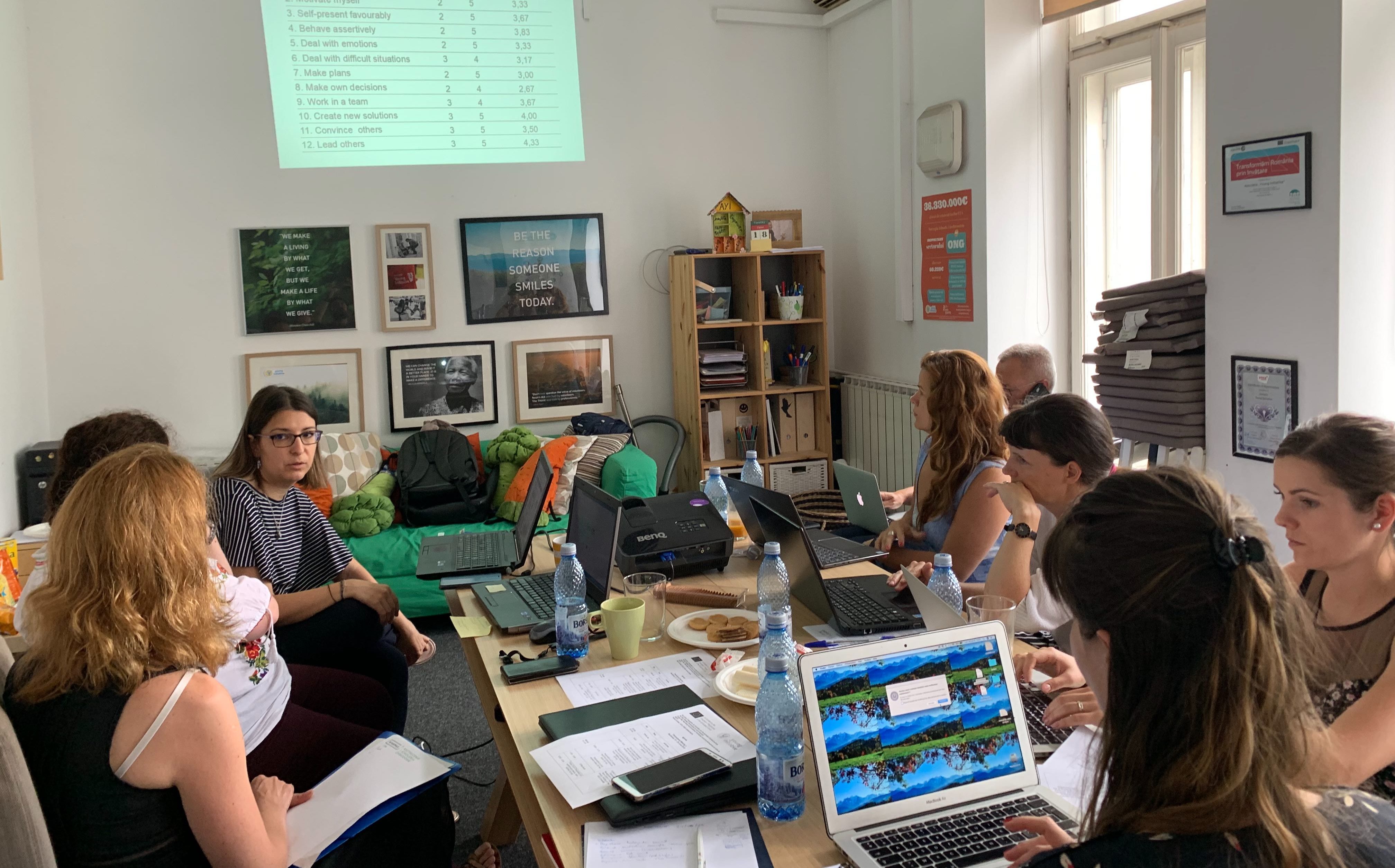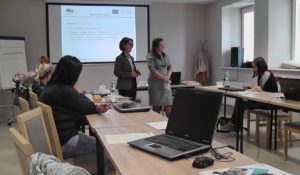
Project “Stop being couch potatoes” is on. Now we know who to help.
Six partners (organisations) from six European countries are working on developing social and entrepreneurial skills for young NEETs. Being together in a project “Stop being couch potatoes” requires a lot of effort from us. But since the aim is to develop innovative practices relating to existing curricula in the field of social and entrepreneurial skills, we know that it’s worth our time.
Developing this is a process, and we do everything step by step. At first, we need to broaden our knowledge about NEETs in our countries, their needs, and their characteristics. Thanks to the initial research we can see how we can influence them and make their lives better.
Meeting in Romania
Recently we met in Romania to summarize our previous collaboration and activities. All of us have done quite a lot of work and we’d like to present what exactly has been done.
During the meeting, we presented the outcomes of our work. Partners have interviewed a group of NEETs in each country to gain knowledge about their opinion and assessment of social and entrepreneurial skills. It was not surprising for us, that the interviews gave different results in each country.
Poland
Polish vocational counselors carried out two types of questionnaires, one regarding their training needs and the other one the assessment of social and entrepreneurial skills. They interviewed a group of 6 NEETs concerning each type of questionnaire.
Polish interviewed NEETs rate themselves with the highest average in the competence “I can work in a team” which includes taking into account the goals and needs of others, working together to achieve a common goal; followed by “I can plan”, “I can deal with conflict, difficult situations”. In contrast, they rate themselves with the lower average in the competence “I can behave in an assertive way defending my rights in social and personal situations” which includes refusing, expressing and receiving criticism and praise, expressing requests and opinions.
The age of the target group was between 20 – 24 and over 29. The areas of interest of Polish interviewed NEETs are effective decision making, skillful conversation, solving difficult situations and conflict issues occurring in interpersonal contacts, assertiveness, self-motivations.
Czech Republic
GIC NORA interviewed a group of 6 NEETs, out of 6, 4 were women and 2 were men. All of the interviewees are in fact clients of a low threshold center called Likusák for children from 12 to 26. The center belongs to Ratolest Brno which is a non-governmental organisation, offering social and preventive services to children, young people, and families in difficult life situations.
The NEETs completed two types of questionnaires, one focused on their training needs and the other one on the assessment of social and entrepreneurial skills. The Czech sample of NEETs expressed a rather low motivation for any type of educational activity. Two NEETs were not at all interested in developing their skills. They also quite frequently expressed that they simply did not know. If they preferred any type of education, then they predominantly opted for a more formal one which would not demand any interactive participation.
Regarding training needs, they were interested most in planning and time management. As for the assessment of their social and entrepreneurial skills, it is very difficult to identify any pattern with the 6 NEETs interviewed. Their answers were in general disparate. Nevertheless, it can be said that except for 1 person other respondents avoided extremes in their answers. On the scale from 1 to 5, i.e. from very low to very high, 5 respondents preferred answers corresponding to 2- 4. Moreover, neutral 3 seemed to be their favorite response.
France
In France, they have interviewed a sample of young people NEETs that were part of a volunteering project to know their needs in terms of social skills and entrepreneurial skills.
Those young people were attending intensive non-formal training in Eurocircle before going abroad for a 4-month volunteering experience in partner organisations in Europe. They had almost no idea of what could be their professional project or goals on a short-medium-long term, but getting involved in a volunteering project was for them the first step into entering professional life: they could develop competencies both hard and soft!
Once they were back, we re-interviewed these young people to better find out what their specific needs are: what are their interests in developing social/entrepreneurial skills? What kind of methods would they like to have? And what would be the fields of learning to prioritize?
The answers were different but 2 main lines were identified:
- A need to speak up: to learn how to speak in public, to present an idea, to defend it and to convince people
- A need to better identify and value skills acquired through a different period in their lives (non-formal, formal, informal) to enlarge their field of professional opportunities (and not to stick to one professional field because of a school degree)
Therefore Eurocircle chose to focus on the development of workshops (based on non-formal methods) that would enable them to gain assertiveness, self-confidence and to have a skillful conversation. A second workshop is focused on identifying skills, acquired through non-formal, informal and formal education, and identifying skills to be developed in the future and how to get ready for a job interview.
Spain
Spanish interviewed NEETs rate themselves with the highest average in the competence “Communicate with others”, which includes making contact, listening actively, making conversation, asking questions, and participating in a discussion; followed by the competence “Lead others”, which includes motivating, encouraging to action, and organizing other activities.
In contrast, the Spanish interviewed NEETs rate themselves with the highest average in the competence “Make own decisions”, which includes collecting and analyzing information, and making choices; followed by the competence “Make plans”, which includes setting targets, achieving them, and managing time.
Slovakia
TRANSFER Slovensko, spol. s r.o. interviewed 6 NEETs, 4 women and 2 men about their training needs and social and enterpreneurial skills. These questionnaires were the output of one project activity whose task was to find out a motivation for education and to show self assessment of social and enterpreneurial skills.
The interviewees were from the age of 15 to 29 with different level of education and background. TRANSFER Slovensko, spol. s r.o. chose, for an interview, NEETs from the region Banská Bystrica who is one of the most vulnerable region as for the unemloyment and therefore this region belongs to the least developed regions of Slovakia.
The completed questionnaires show that NEETs in Slovakia would like to increase their knowledges and skills that are associated with looking for a job, e.g. self – presentation or skilful conversation. To acquire these knowledges and skills they prefer workshop as the right form because there they can inspire and help each other.
The answers in the social and enterpreneurial skills questionnaires can be divided into two groups. One group is convinces that it has the social and enterpreneurial skills such as communication, self – presentation, dealing with emotions, planning, working in a team, creativity etc. on the other hand the second group answered that it doesn´t have these skills. In this case it is quite difficult to draw a conclusion that clearly shows whether or not NEETs have social and enterpreneurial skills. This topic requires deeper analysis.
Romania
Through the project “Stop being couch potatoes! Developing social and entrepreneurial skills for NEETs”, Young Initiative Association interviewed a group of 6 NEETs from Romania (from rural and urban areas).
The group was composed by 4 men and 2 women with the age between 20 and 29 years old. The education level of the group was as following: 4 people graduated from Junior high school / college, 1 person graduated from vocational school and 1 person didn’t finish primary school.


The NEETs completed two types of questionnaires, one focused on the assessment of social and entrepreneurial skills and the other one on their training needs.
Based on the interview results, our interviewer selected the following competence with the highest average: Communicate with others, which includes making contact, listening actively, making conversation, asking questions, and participating in a discussion; followed by the competence; and To be capable of making my own decisions, which includes collecting and analyzing information, making choices.


The competence that had the lowest score is: To be able to lead others, which includes motivating, encouraging to action, organizing other activities.

Related with their training needs, 3 people expressed the highest interest (4 or 5 points) in developing social and entrepreneurial skills and 3 people rated a medium interest (2 or 3 points). We can link this answer with their choice related to the scope of the training in which they want to be involved – Self-motivation (5 out of 6 people choose this objective for the future training). Interestingly, respondents have chosen as their second scope for the future trainings – Effective communication with other people (4 people from 6), and at the same time, they choose Communicate with others as their most developed competence.

Workshop was the most popular method of learning chosen by the interviewers.
What we achieved?
All of those activities have a great impact on how we face the problem of NEETs right now.
During the meeting we had a chance to share experiences in the field of young people and Neets on the labor market in our countries, learned new solutions how to help the target group to improve their potential employability by acquiring or updating basic and general skills, play an active role in the society. As partner organisations we learn from others and reflect upon our practices.
Thanks to this, we create a proactive approach, reinforce a positive way of perceiving ourselves by young people. We also can build a new network of contacts and exchange experiences with project partners.


